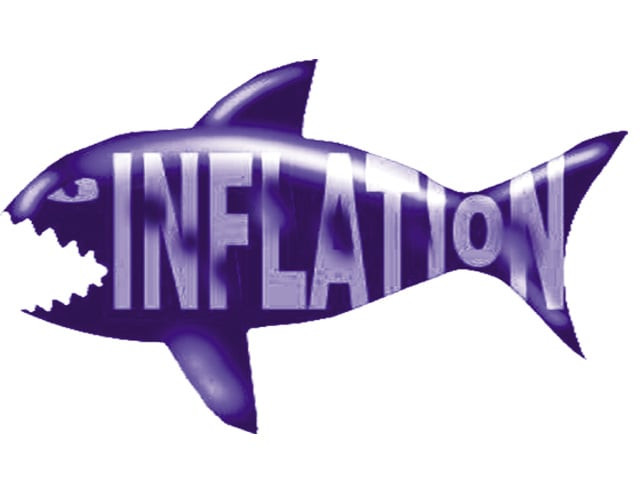Inflation clocks in at 5.9%, surprising all
Critics say use of data for only first two weeks of June distorts final figure.

7.4% is the average inflation witnessed in fiscal year 2012-13, as compared to the preceding year. DESIGN: ASAD SALEEM
Inflation rose to 5.9% in June 2013 over the same month a year ago on the back of a general increase in prices of almost all commodities, after the government implemented an increased sales tax rate from the middle of last month.
The Pakistan Bureau of Statistics’ (PBS) latest data, released on Monday, shows that inflation measured by the Consumer Price Index (CPI) clocked in at 5.9% in June 2013 over the same month last year. Sequentially, inflation was 0.8% higher than recorded in May.
Experts were expecting a higher increase in inflation rates, but the PBS has captured data for only the first two weeks of June, while a major increase in prices was observed after June 22. Experts said that the ‘sympathy factor’ – a phenomenon when prices increase by more than the increase in tax rates – was the main reason behind the increase in inflation in June.

A major push came from perishable food items, whose prices increased by 15.1% in June over the same month of last year, according to the PBS. Meanwhile, clothing and footwear saw prices rise by 13.7% year-on-year, said the PBS.
Meanwhile, fuel and food-adjusted inflation eased to 7.8% in June over a year ago – which independent experts are again not ready to accept. They give more importance to core inflation as a reliable indicator, since it is exogenous to seasonal price shocks as it excludes food and energy items.
Experts have forecast that the upward trend in prices of essential commodities will continue, as prices are expected to go up during Ramazan. This rise in prices will also be accompanied by an anticipated increase in electricity prices.
For the new fiscal year, the PML-N government has targeted to keep inflation confined to 8%, a goal that many believe will not be achieved. Even the International Monetary Fund has questioned this target, while anticipating that inflation will remain close to the double digits.
But an analysis conducted by Shajar Capital showed that even if CPI persists in the single digits, a looming risk to the state of the economy is the country’s external position and its consequent impact on currency. Pursuant to this factor, Shajar Capital said that CPI in the new fiscal year (2013-14) will likely clock in at 9%, compared to the budgetary target of 8%.
Average Inflation
Average inflation over the last fiscal year (2012-13), which closed on Sunday, remained at 7.4% over the preceding fiscal year (2011-12), according to the PBS. Even though the figures are likely to stoke controversy due to inconsistencies in the methodology used to calculate them, the previous government seems to have achieved at least one macroeconomic target: it had set the inflation target at a maximum 9.5%.
Published in The Express Tribune, July 2nd, 2013.
Like Business on Facebook, follow @TribuneBiz on Twitter to stay informed and join in the conversation.











1724319076-0/Untitled-design-(5)1724319076-0-208x130.webp)






COMMENTS
Comments are moderated and generally will be posted if they are on-topic and not abusive.
For more information, please see our Comments FAQ